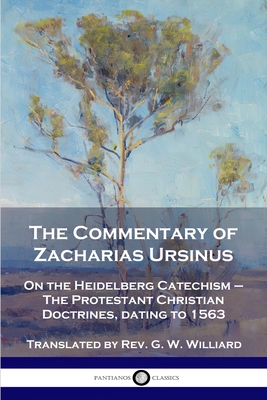The Commentary of Zacharias Ursinus on the Heidelberg Catechism: On the Heidelberg Catechism - The Protestant Christian Doctrines, dating to 1563

The Commentary of Zacharias Ursinus on the Heidelberg Catechism: On the Heidelberg Catechism - The Protestant Christian Doctrines, dating to 1563
Zacharias Ursinus was a Reformed Christian theologian who authored the Heidelberg Catechism, an early Protestant document about faith, written in question-and-answer format.
Living amid the fractious religious upheaval that ensued following the Protestant Reformation, Ursinus was in the vanguard of theologians and Christian authors in Germany. The newly-established Reformed church wished to cement its influence among the populace; to this end, authors wrote and published a series of books that answered queries on faith. The Heidelberg Catechism was one of the most influential, gaining a wide readership and proving vital to the establishment of Protestantism, with its organized composition of 52 Lord's Days - one for each week of the year - allowing for ease of teaching.
Ursinus's explanations are cogent, setting out principles of Christianity by answering a variety of questions on subjects such as Jesus Christ, baptism, sin, forgiveness and salvation. Both the New Testament Gospels and Old Testament lore are examined; of particular note is the author's explanations of Moses' Ten Commandments and their unceasing importance in Christian life. Cultural questions are also considered; the role of the church in society, and the ceremonies that believers participate in. There are notable allusions to the ongoing hostilities of his time; Ursinus occasionally makes derogatory references to the Catholic church, referring to its believers as a 'Popish mass'.
PRP: 206.50 Lei
Acesta este Prețul Recomandat de Producător. Prețul de vânzare al produsului este afișat mai jos.
185.85Lei
185.85Lei
206.50 LeiLivrare in 2-4 saptamani
Descrierea produsului
Zacharias Ursinus was a Reformed Christian theologian who authored the Heidelberg Catechism, an early Protestant document about faith, written in question-and-answer format.
Living amid the fractious religious upheaval that ensued following the Protestant Reformation, Ursinus was in the vanguard of theologians and Christian authors in Germany. The newly-established Reformed church wished to cement its influence among the populace; to this end, authors wrote and published a series of books that answered queries on faith. The Heidelberg Catechism was one of the most influential, gaining a wide readership and proving vital to the establishment of Protestantism, with its organized composition of 52 Lord's Days - one for each week of the year - allowing for ease of teaching.
Ursinus's explanations are cogent, setting out principles of Christianity by answering a variety of questions on subjects such as Jesus Christ, baptism, sin, forgiveness and salvation. Both the New Testament Gospels and Old Testament lore are examined; of particular note is the author's explanations of Moses' Ten Commandments and their unceasing importance in Christian life. Cultural questions are also considered; the role of the church in society, and the ceremonies that believers participate in. There are notable allusions to the ongoing hostilities of his time; Ursinus occasionally makes derogatory references to the Catholic church, referring to its believers as a 'Popish mass'.
Detaliile produsului











